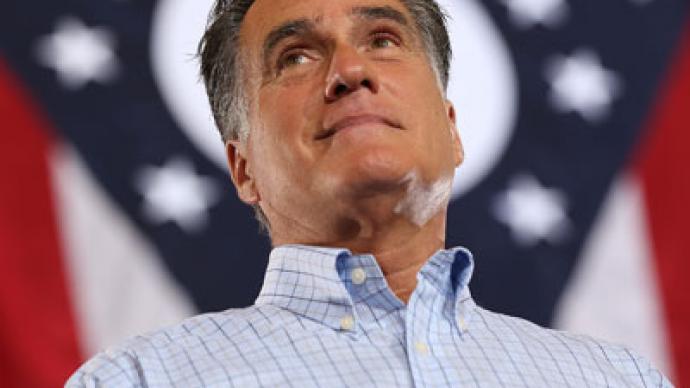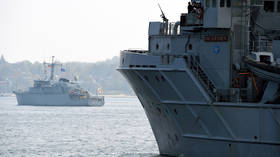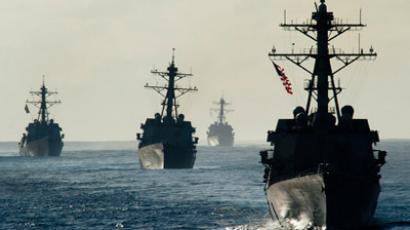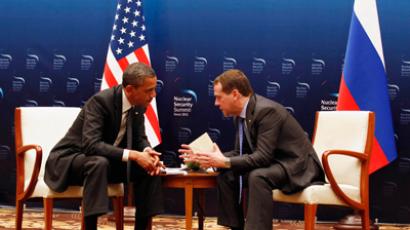Romney’s anti-Russian message won’t win him the White House - Pushkov

Mitt Romney – the US Republican Party presidential candidate known for his broadsides against Russia – has little chance of beating President Barack Obama in the November elections, the head of the Duma’s International Affairs Committee said.
“Romney's chances of beating Obama don't look very convincing,” Alexei Pushkov told reporters as the US presidential campaign starts to turn ugly.Pushkov cited recent polls showing Romney, 65, trailing far behind Obama by a margin of almost 15 percent.The head of the International Affairs Committee faults Romney, along with his running mate Paul Ryan, for wanting to continue the hawkish policies of the Bush administration."The program of the Romney-Ryan tandem announced this week is actually the second edition of the foreign policy of the [George W.] Bush administration, which failed to deliver on American leadership," Pushkov said.He told the press conference that the Bush administration, "got stuck in Iraq, and failed to win the war in Afghanistan.” As a result of these failures, “by the end of his second presidential term his popularity rating was below 30 percent," he said.Romney, in an effort to attract votes in a divisive presidential season that resembles mud wrestling at a roadside café, launched another salvo of rhetorical rockets at Russia last week.“Under my administration, our friends will see more loyalty, and…Putin will see a little less flexibility and more backbone,” Romney told an enthusiastic crowd at the Republican National Convention in Tampa, Florida, last week.In March, Romney criticized the Democratic incumbent for being ‘soft’ on the Kremlin, which he described as America’s "greatest geopolitical foe." Romney’s presidential nomination speech, which portrayed the Obama administration as conceding to a ‘reset’ with the Kremlin in order to pass an arms reduction treaty, also pushed hard for a US missile defense shield in Eastern Europe – without Russia’s participation.This criticism of the Obama administration, however, seems a bit misplaced since Washington continues to deny Russia's participation in the missile defense program. Meanwhile, Moscow has issued repeated warnings tthat the construction of a missile shield in former Warsaw Pact territory could trigger another arms race. Pushkov compared Romney’s harsh rhetoric to former GOP presidential candidate John McCain, who lost against Obama in the 2008 elections. He believes that Romney is a voice for some American voters who are troubled by the prospects of global power shifting steadily eastward."Romney is now trying to play on the deep frustration of part of US public troubled by the fact that the center of power, primarily economic, is increasingly shifting to China, i.e. from the Western world to Asia," he said."The slogan that America should rule the world is long outdated. … Bush, Jr. and McCain did not realize that, and now Romney.”The Duma official argued that Romney's inflexible remarks on Russia show all the hallmarks of George W. Bush's eight years in power: "Washington in that period appeared tough, attempting to impose their terms on Moscow, which included an imbalanced approach to missile defense in Eastern Europe, together with lessons on democracy and human rights."Pushkov’s comparison between Romney and Bush recalls President Vladimir Putin’s speech at the Munich security conference in 2007, midway through Bush’s second term in office."The United States has overstepped its borders in all spheres – economic, political and humanitarian, and has imposed itself on other states," Putin said during the conference. “We are increasingly concerned by this…hyper use of force." In Pushkov’s opinion, Romney will be a regular critic of Putin, as was typical of Bush’s second term in office, when the globe-spanning ‘War on Terror’ was fully underway..Pushkov also ridiculed Romney’s suggestion that Russians “deserve something better” than Putin’s leadership."Romney intends to return to the criticism that suggests the Russian people deserve something better. But we had this "better" in the 1990s when the economic collapse occurred, when child mortality soared 40-fold, and the life expectancy of males dropped to 56 years," Pushkov said.Romney's policies will find little support outside of America’s radical right wing, he added.Pushkov argued that a Romney victory would hurt Washington more than Moscow, since the US needs Russia’s support on a variety of issues. "In the case of a Romney victory, the deterioration of bilateral relations will cost America much more than Russia,” he said. “Because after admission to the WTO, this country does not need the support of the White House very much, while Americans need Moscow's support on Iran, Afghanistan, North Korea and on the question of nuclear nonproliferation."US politicians regularly play the ‘Russia card’ during campaign season, a game that could eventually do irreparable damage to Russia-US relations. Due in part to this and similar saber-rattling, America’s political pendulum has swung severely to the right over the past decade. Eight years of Neoconservative-led military expansionism under the Bush II administration only accelerated this trend. Given Romney’s criticism of Obama’s handling of Russia – which has been anything but amicable – one wonders what the Republican contender would do differently if he were to win the White House in November. As Pushkov’s comments show, Moscow has no desire to find out if Romney’s rhetoric is real or not.Robert Bridge, RT














